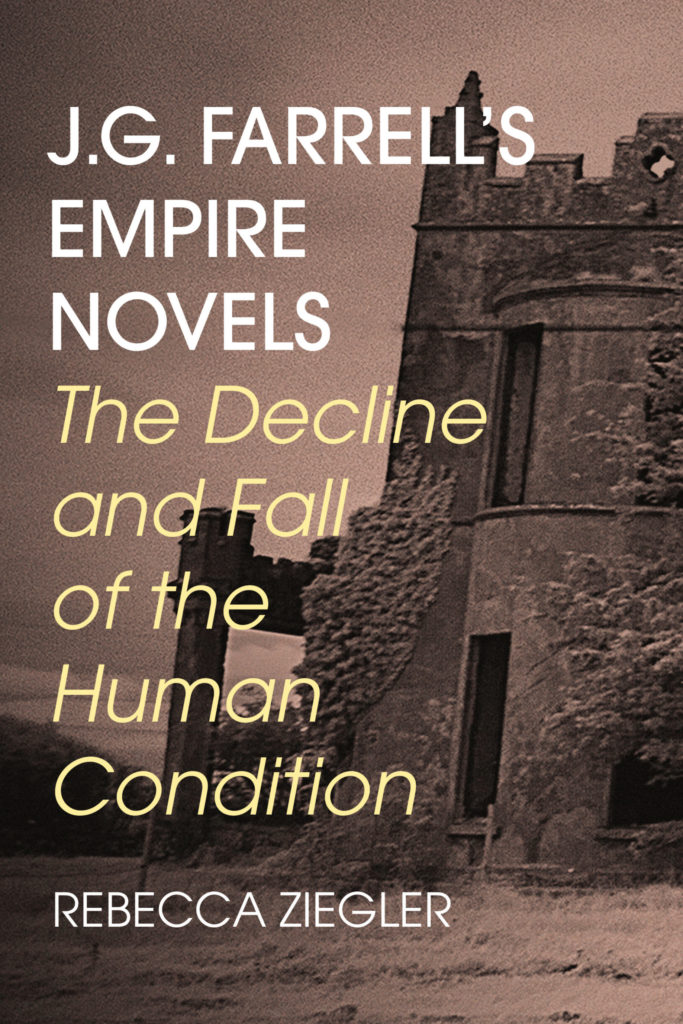
I first discovered J.G. Farrell through another favourite author of mine, Alison Lurie. In Lurie’s novel Foreign Affairs, her character Vinnie Miner is reading Farrell’s The Singapore Grip. I thought, ‘Any novelist of interest to Alison Lurie is likely to appeal to me, also’. So, I went on to read The Singapore Grip, and eventually, all of Farrell’s other novels.
I probably focused on Farrell’s Empire novels because I have a penchant for historical fiction. But what especially fascinated me was the way in which Farrell treats the direst human situations with humour. Farrell certainly had ample opportunity to learn the value of black humour in his own life. The best of his pre-Empire Series novels is the semi-autobiographical novel The Lung, in which he treats his own experience with polio as darkly, hilariously funny.
Like Elizabeth Bennett, I dearly love to laugh, and much in Farrell’s writing causes me, in his own inimitable phrase, to ‘shed a great bark of laughter’. When I was researching Farrell’s papers at Trinity College Dublin, I would often startle other researchers in the reading room by doing just that.
So much of Farrell’s humour depends on his antic use of words. He often chooses words that at first seem funny because they are so incongruous or inappropriate, but that, upon reflection, have all sorts of relevances to the situation. Two figures shed that ‘great bark of laughter’: one is a man and the other is a Pontiac automobile. The phrase itself confuses categories, since bark could suggest either a dog or a tree. When one teases out the situation in the novel, an important point is that all sorts of other categories are being violated, as well.
Another favourite of mine in Farrell’s humorous word choices is the pudding that ‘crouches’ on the plate of a rubber magnate. We would usually think of crouching as the act of an animal preparing to spring. In the situation, the rubber magnate is brooding about things that threaten his way of life, especially labour strikes. No wonder he feels threatened by the pudding in front of him!
Farrell’s central concern is with the human condition, which he likens to a state of siege. Again, he makes this concern evident in a humorous and seemingly incongruous way. A major character is a dog named The Human Condition. This poor creature is ageing, physically decrepit, abandoned by his master who has fled the bombed city, and apparently destined to be put down.
The human condition, as is richly evident in all the books of the Empire Series, is one in which just about everything in and around human beings, whether abstract ideas, ceremonies and other patterned behaviour, or concrete things, escapes their control and works against them in a way that is both devastating and funny. Especially appalling and hilarious is the disruption of a very British afternoon tea ceremony when the table is sliced in two by a letter M falling from the façade of a rundown hotel in Wexford that was once the playground of the Anglo-Irish aristocracy. This incident is only one of a number of hilariously devastated tea parties in Farrell’s books.
One can sense a demonic glee like that of the grotesque temptors of St. Anthony in Northern Renaissance art, as, one after another, the things that people think make them uniquely human are snatched away from them. Finally, all that is left to human beings – and this is the serious moral point of Farrell’s Empire Series – is to abandon the pursuit of ideals and merely try to mitigate the situation at hand (however unsuccessfully).
An American university student showed what I thought was remarkable insight when he said that Farrell’s The Siege of Krishnapur reminded him of Monty Python.
Article by Rebecca Ziegler
Rebecca Ziegler is the author of J.G. Farrell’s Empire Novels: the decline and fall of the Human Condition Fjhjour Courts Press). She has a B.A. from the University of Chicago and an interdisciplinary Ph.D., as well as a master’s in library science, from the University of California at Los Angeles. She has spent her career as an academic librarian at Georgia Southern University, where she was the library liaison to most fields of the humanities, including literature. She is now retired with emeritus status. For many years she has participated in the annual Conference of British Commonwealth and Postcolonial Studies founded and organised by faculty at Georgia Southern University. Her book on J.G. Farrell grew out of papers that she gave at that conference.











